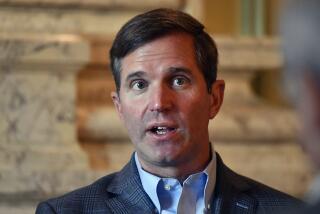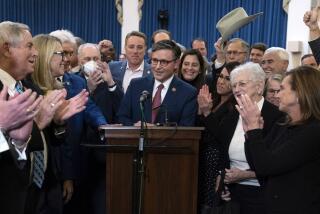Boehner stands firm on agenda
WASHINGTON — John A. Boehner has been the “Hell, no!” face of the Republican Party in Congress for years, but he appeared a more gracious presumed speaker of the House on Wednesday, even as he stood firm on the promises of smaller government that the GOP rode to a majority.
Boehner is well aware that his is a story of second chances: The Ohio congressman has been in and out of leadership positions, as has his Republican Party, which angry voters routed from the majority just four years ago.
As Boehner is about to ascend to the job he covets, his ability to lead raucous House Republicans emboldened by “tea party” activists will test even this most old-school of Washington hands.
A day after the Republican victory wave brought him to tears, Boehner was neither emotional nor the combative conservative who has spent two years as opponent-in-chief of the Obama administration.
Instead, Boehner said he was “humbled” at the opportunity before him and said he hoped to find common ground with Obama and the Democrats in attacking the nation’s economic woes.
But he also made clear that there was a message in the GOP’s electoral sweep: Working together would not mean meeting in the middle. Instead, Democrats must shift to the right and accept the Republican agenda of a smaller government.
About the president, Boehner offered politely: “We hope he is willing to work with us on these priorities.”
Speaking in broad strokes but offering few details, Boehner presented governing goals that hewed to the tidy campaign themes that drove the Republican romp.
House Republicans will pursue spending cuts and job-creation policies, calling cards of the incoming Republican majority. Gone from the GOP agenda are the morality crusades over issues such as gay marriage or abortion.
“Republicans have made a pledge to America to listen to the people and focus on their priorities, and that’s exactly what we’re going to do,” Boehner said.
But Boehner will have to navigate differences among House Republican over how this agenda will be accomplished. Even as the GOP has narrowed politically, with fewer moderates, Boehner faces a nuanced divide on the best route to conservative governance.
The victorious tea party candidates are expected to arrive in Washington determined to gut government, and will no doubt need to be persuaded by more experienced Republicans about the pace at which government spending can realistically be reduced.
Even as Boehner was speaking, Rep. Eric Cantor of Virginia, the presumed majority leader, unveiled a 22-page proposal of budget cuts and Obama-policy reversals, including repeal of the new healthcare law. Rep. Michele Bachmann (R-Minn.), the tea-party firebrand, announced her bid for a Republican Party leadership post, as did conservative Rep. Jeb Hensarling (R-Texas). Rep. Paul D. Ryan (R-Wis.) was in line to become chairman of the Budget Committee, a venue that would give voice to his controversial proposals to allow individual retirement accounts as part of Social Security and vouchers for Medicare.
Boehner dismissed GOP differences.
“What unites us as Republicans will be the agenda of the American people,” he said. “If we’re listening to the American people, I don’t see any problem incorporating most of the tea party along with our party.”
Washington has long known the emotional side of Boehner -- the sentimentalist who tears up when talking about veterans in wartime or his family back home. But the bombastic Boehner is always close at hand, even if quieted in the post-election victory.
Yet Boehner’s tone reflected recognition of what exit polls showed Tuesday: Voters overwhelmingly disapprove of the GOP’s performance in Congress too.
Despite a gain of more than 50 House seats, Republicans know that an unhappy electorate has handed them a fragile hold on the majority, with a two-year window to show results, lest they be ousted as quickly as the Democrats.
“They recognize the American people are giving them one more shot,” said Ron Bonjean, a GOP strategist and former House leadership aide. “The Republican leaders know they could be handed their pink slips in 2012 and tried to show humility and a sense of the task at hand.”
James P. Oliphant in the Washington bureau contributed to this report.
More to Read
Get the L.A. Times Politics newsletter
Deeply reported insights into legislation, politics and policy from Sacramento, Washington and beyond. In your inbox three times per week.
You may occasionally receive promotional content from the Los Angeles Times.











